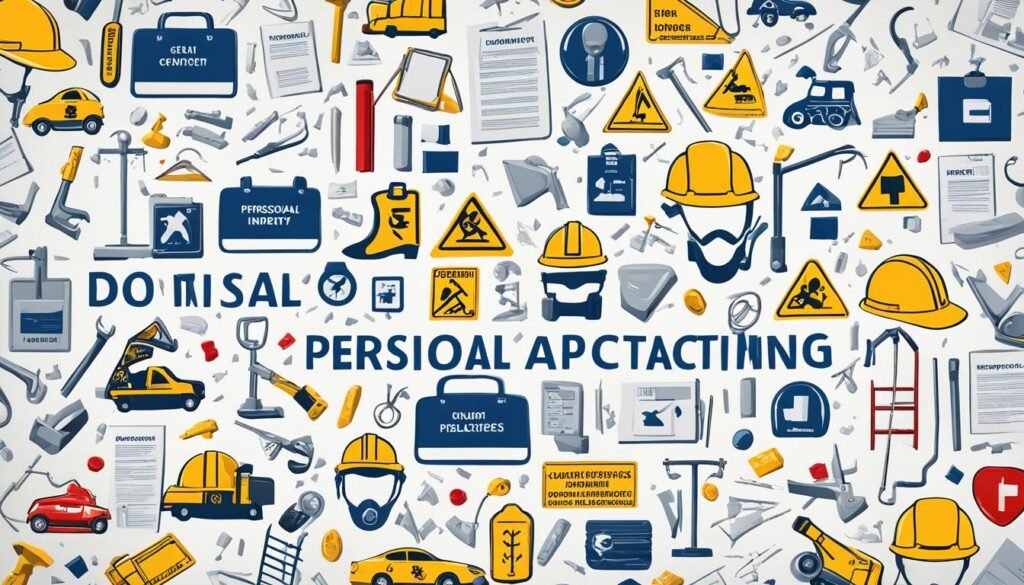Every year, about 39.5 million people visit emergency departments in the U.S. because of unintentional injuries. These injuries can happen at work, on the road, or in public places. They often need a lawyer’s help. Knowing insider tips from your personal injury attorney is key.
Getting to know the details of personal injury claims and your rights is important. It can really make a difference in your case. With the right advice, you can avoid mistakes and know your legal options better.
Key Takeaways:
- Gain valuable insights from your personal injury attorney to optimize your chances of obtaining fair compensation.
- Knowing the tips and secrets of finding the right personal injury lawyer can greatly impact the outcome of your case.
- Understanding the basics and types of personal injury claims is essential for building a strong foundation in pursuing your legal rights.
- Filing a personal injury claim involves a step-by-step process that requires careful guidance and attention to detail.
- Gathering compelling evidence is crucial in building a strong case to support your personal injury claim.
How to Find a Personal Injury Lawyer: 7 Secret Tips
Finding the perfect personal injury lawyer is important. There are tips and secrets to make this easier for you. These tips increase your chances of finding the ideal attorney for your case.
- Research and Evaluate: Begin by looking for personal injury lawyers in your area. Choose those who focus on personal injury cases and have won many. Check their experience, credentials, and reviews to find someone who knows their stuff.
- History of Trials: Find a lawyer who takes cases to trial often. Even if many cases settle outside court, a lawyer willing to fight in trial is serious about getting you what you deserve.
- Client Testimonials: Ask to talk to the lawyer’s former clients. Hear what they say about the lawyer’s way of communicating and how happy they were with the services. This gives you deeper insights.
- Specialization in Personal Injury: Make sure your lawyer is a personal injury expert. Personal injury cases are complex. A specialist knows the ins and outs to manage your case well.
- Free Consultation: Use the free consultations personal injury lawyers offer. You can talk about your case, ask questions, and see if the lawyer feels right for you.
- Fee Structure: Know how the lawyer gets paid before you hire them. Most work on a “no win, no fee” basis. Understand how much they’ll take from your win upfront.
- Trust Your Instincts: Listening to your gut is key when choosing a lawyer. You should feel at ease and sure about your legal representation. If not, keep searching until you find someone you trust completely.

“Finding the right personal injury lawyer is crucial to the success of your case. Take the time to research, evaluate, and trust your instincts. By following these secret tips, you can find a lawyer who will fight for your rights and help you obtain the compensation you deserve.”
Understanding Personal Injury Claims: Basics and Types
Before you start a personal injury claim, knowing the basics is key. Such claims can come from car crashes, work accidents, or medical mistakes. This knowledge helps you move through the legal steps wisely and make smart choices about your case.
Personal injury claims often rest on three legal ideas:
- Negligence: These cases show someone did not take enough care, causing injury or harm.
- Strict Liability: These involve injuries from flawed products or risky activities, without needing to prove fault.
- Intentional Wrongs: Some cases are about deliberate acts that hurt someone, like assault.
Types of Personal Injury Cases
Personal injury claims deal with many kinds of accidents and issues. Here’s a look at some common ones:
| Types of Personal Injury Cases | Description |
|---|---|
| Car Accidents | Accidents involving cars, trucks, motorcycles, or other vehicles. |
| Slip and Fall | Accidents due to unsafe places or poor property upkeep. |
| Medical Malpractice | When medical pros make errors that harm patients. |
| Workplace Accidents | Injuries at work from negligence or unsafe spots. |
| Product Liability | Harm caused by faulty or unsafe products. |
| Wrongful Death | Families sue for the death of a loved one due to someone else’s fault or intent. |
Here’s what to think about for a personal injury claim:
- How your injuries impact your life.
- The losses you’ve had, like medical bills, lost income, and suffering.
- Any proof you have, including witness accounts, doctor’s notes, and accident reports.
- The time limit to file your claim, known as the statute of limitations.
Knowing the basics and types of personal injury claims can help you through the legal steps. It aids in seeking the right compensation.
Here is an image related to personal injury claims:

Step-by-Step Guide to Filing a Personal Injury Claim
Filing a personal injury claim can seem like a big task if you’re new to legal things. But, with the right help, you can move through the steps to get what you deserve for your injury. We’ll guide you, from seeking a lawyer’s help to gathering proof and getting a fair settlement.
Step 1: Seek Legal Advice
The very first thing you should do is talk to a skilled personal injury lawyer. They will explain your legal rights, look into how strong your case is, and support you through the whole process.
Step 2: Document the Incident
Gathering and saving evidence is key for your injury claim. Snap pictures of where the accident happened, get statements from people who saw it, and hold onto records of any medical care or costs from the accident.
Step 3: File an Insurance Claim
If it fits, let the insurance companies know about the accident and that you’re filing a claim. Give them all the details they need, like when and where it happened, along with any proof you have.
Step 4: Demand Letter
In some situations, a demand letter might start the discussion for a settlement. Your lawyer will create a detailed letter for you. It will list your injuries, the damage done, and the money you want from the person responsible.
Step 5: Negotiate a Settlement
After the demand letter is out, it’s time to talk terms. Your lawyer will handle talks for you, aiming to get a fair deal. Remember to be patient and trust your lawyer’s ability during these talks.
Step 6: Consider Litigation
If talking doesn’t lead to a good deal, your lawyer might suggest going to court. Court can take time, but your lawyer will help at every step and fight for you.
Step 7: Finalize the Claim
When you reach a settlement or win in court, the last step is closing the claim. This means signing any legal papers needed, following court directions, and making sure you get your compensation.
Every personal injury case is different, so the steps might change a bit for you. That’s why having a lawyer who knows what they’re doing is so important. They make sure you do things right and help you win your claim.
| Step | Description |
|---|---|
| Step 1 | Seek Legal Advice |
| Step 2 | Document the Incident |
| Step 3 | File an Insurance Claim |
| Step 4 | Demand Letter |
| Step 5 | Negotiate a Settlement |
| Step 6 | Consider Litigation |
| Step 7 | Finalize the Claim |
Building a Strong Case: Gathering Compelling Evidence
When you have a personal injury claim, it’s key to gather strong evidence. This evidence is the core of your case. It shows your claims are true in court. With the right evidence, you boost your chance of a good outcome.
The Types of Evidence for Personal Injury Claims
There are several types of evidence you should collect:
| Evidence | Description |
|---|---|
| Medical Documentation and Records | Any medical documentation, including medical reports, doctor’s notes, hospital invoices, and prescription records, that prove the extent of your injuries and the treatment you have received. |
| Witness Statements | Statements from witnesses who saw the accident or injuries occur. These statements can provide crucial support for your version of events. |
| Documentation of Damages | Any documentation that quantifies the damages you have suffered, such as repair estimates, bills, or receipts for property damage or additional expenses resulting from the injury. |
| Expert Opinions and Reports | Opinions or reports from expert witnesses who can provide specialized knowledge or analysis relevant to your case, such as accident reconstruction experts or medical professionals. |
This evidence makes your case strong by showing facts. It proves your injuries are severe and who is at fault. Get this evidence quickly to make sure it’s valid.
Remember, gathering compelling evidence is like assembling the pieces of a puzzle. Each piece contributes to the bigger picture and strengthens your case.
After collecting the evidence, it’s important to organize it well. Your injury lawyer will help you compile and showcase it. This will make your claim stronger in court or during talks. With solid evidence, you show your claim is valid. This increases your chances of getting the compensation you deserve.
Evaluating Damages: Determining the Value of Your Claim
Finding out the right amount for damages is key in getting what you deserve for your injury. When figuring out what you should get for a personal injury claim, many things matter. We’ll look at the main things that decide how much your claim is worth.
Economic Damages: Medical Expenses and Lost Wages
Evaluating your losses means looking at economic damages first. These are the money problems caused by your injury. You might have big medical bills, money spent on medicine, surgeries, rehab, and treatment you’ll need later. You might also lose money if you can’t work while you get better.
To value economic damages right, you need all your bills and pay info. Collect medical records, bills, and pay stubs to see the full cost of your injury.
Non-Economic Damages: Pain and Suffering
Besides money losses, your claim’s value also includes non-economic damages. This covers the physical and emotional pain caused by the accident. These damages are about the bad feelings that don’t have a price tag.
Finding a dollar amount for non-economic damages is hard. The law looks at how bad your injuries are, how they change your life and how long you hurt. This helps decide what’s fair for you.
Consulting with an Experienced Personal Injury Attorney
It’s possible to figure out your claim’s value alone, but talking to a pro lawyer is better. A good lawyer knows personal injury law inside and out. They will look at your situation, know the law, and guide you on damages.
With a good lawyer’s help, you can deal with claim issues better. You get a better chance for fair pay, and can heal without worrying about legal problems.
Conclusion
Understanding what your personal injury attorney wishes you knew helps a lot with your personal injury claim. By learning the insider tips on finding a lawyer and understanding personal injury claims, you can navigate the legal world better. This knowledge increases your chances of getting the compensation you deserve.
If you need a skilled personal injury attorney, reach out to Super Attorneys Of Irvine at 949-996-9546. Or visit businesslawyersirvine.com to connect with their expert team. Being well-informed is crucial for success in your personal injury claim journey.

